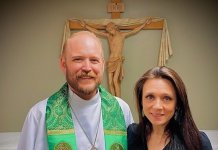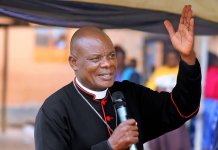| Archives of the Church of Uganda Online Kept at Uganda Christian University, Mukono The records in this collection document the history of the Church of the Province of Uganda, including some of the rst written documents about and originating from Uganda. It covers the period from the arrival of the rst Church Missionary Society missionaries at King Mutesa’s court (1877) to the early 1980s. Contents of the collection include legal and administrative documents, correspondence, publications, personal records and more from the Oces of the Archbishops and Bishops of Uganda, the Education Secretary General, the General, Financial, and Provincial Secretaries, the Provincial Treasurer, and the Mother’s Union. • Dates: 1882 until early 1980s • Languages used: predominantly English, Bantu languages • Location of originals: Uganda Christian University, Mukono This publication was realized with the support of the Kenneth Scott Latourette Fund, Yale Divinity School Library. Christianity came to Uganda relatively late compared to many other parts of Africa. The first Church Missionary Society missionaries arrived at King Mutesa’s court on 30 June 1877, seventy-eight years after the founding of the Church Missionary Society in Great Britain. However, within eight decades, after having passed through much persecution, Uganda had become one of the most successful mission elds in the world. By 1914, through its indigenous teachers and a few European missionaries, nearly the whole of present-day Uganda had already been evangelized. In 1961 the growth of the Church of Uganda was recognized in the Anglican Communion with the establishment of the Church of the Province of Uganda, Rwanda-Burundi and Boga- Zaire. This collection is an important source not only for the history of Christianity in Uganda, but also for the political and social development of the country, both before and after its independence. Content of the collection 1. Oce of the Bishop of Uganda – (1882-1961). These records trace the development of the Church Missionary Society (CMS) Uganda Mission and the Native Anglican Church (NAC) in Uganda, including the Uganda Diocese and the Diocese of the Upper Nile. 2. Education Secretary General – (1936-1964). These records document the development and operations of the CMS/NAC schools, their governing bodies, and their interaction with the Uganda Protectorate Education Department which regulated education within Uganda. 3. General Secretary – (1924-1963). The General Secretary served as administrator for the Bishop, so the records in this group are complementary to those found in the Oce of the Bishop of Uganda and Education Secretary General. The CMS/NAC General Secretary also served as the Archdeacon of the Uganda Diocese. 4. Financial Secretary – (1929-1963). 5. Archbishop’s Oce – (1960- 1993). The Archbishop’s Oce replaced the Bishop’s Oce when the Church of the Province of Uganda was established in 1961. The Diocese’s structure changed during the transition from the Native Anglican Church to the Church of Uganda (COU) but many programs continued. 6. Provincial Secretary – (1960-1995). The Provincial Secretary replaced the General Secretary when the Church of the Province of Uganda was established in 1961. These records are complementary to the Archbishop’s Oce records in the Archbishop’s Oce. 7. Mother’s Union (1960-1991). This collection contains all les related to Women’s work and Women’s Organizations. 8. Provincial Treasurer (1960-1991). This eighth collection contains the les of the Provincial Treasurer as well as correspondence with the provinces of Uganda and with related organizations such as the WCC and Missionary Societies. Contents note Correspondence, reports, minutes, development plans, policy statements, constitutions and legal documents, contracts, registers (for marriages, baptism and conrmation), publications, personal records, staf lists since the founding of the Church in 1877 up to early 1980s. Subjects History of Africa; History of Religion; Mission Studies; Education; Political issues; Land; Sacraments; Finances; Church ministers; Church work; World Christianity; Ecumenism Language note Predominantly English, Bantu languages |










